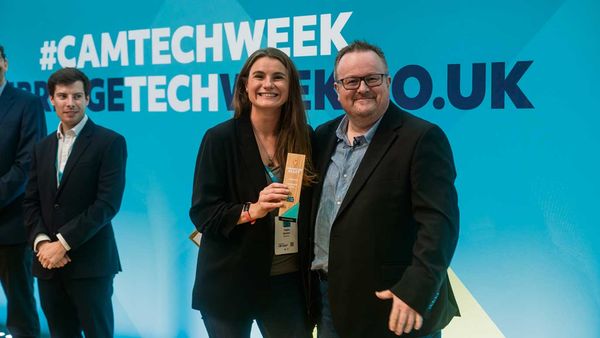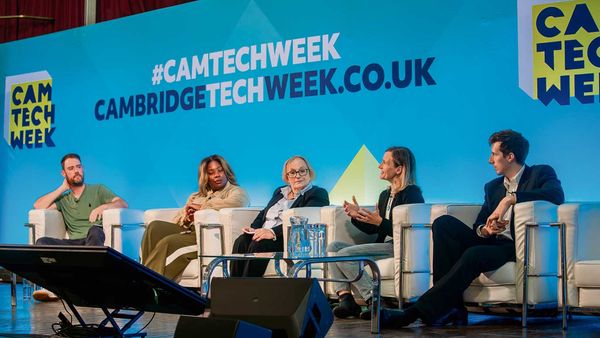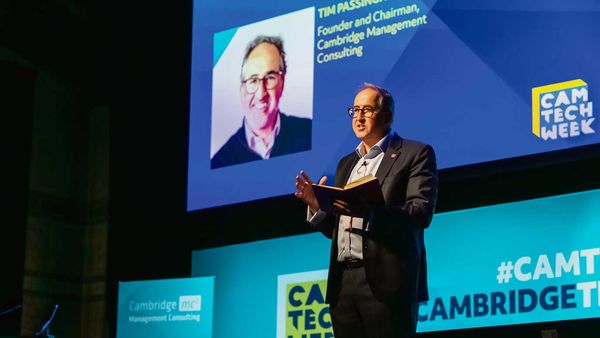Cambridge Tech Week: Where visionaries met reality

Across multiple venues, the week offered a dynamic mix of big-stage keynotes, spirited debates, hands-on workshops, and a buzzing Innovation Alley where early-stage companies showcased technologies poised to redefine entire industries.
The dedicated Start-up to Scale up Day, high-energy pitch sessions, deep dives into Climate Tech, MedTech, and Quantum, and the now-legendary Big Tech Debate ensured that delegates left with one clear impression: Cambridge isn’t just imagining the future, it’s building it.
As Rupert Baines, chair of the 2025 Steering Committee, reflected, the week was about pushing discussion and debate, challenging assumptions and inspiring action:
The mood online was electric. National and international press hailed Cambridge Tech Week as both a celebration of the UK’s tech ecosystem and a practical guide for delegates eager to make things happen. Social feeds were alive with session highlights, fiery speaker quotes, and snapshots of serendipitous networking moments, capturing the energy and excitement that pulsed through the city.
Our preliminary numbers show a 30% increase in unique delegates compared to last year, and more than double the attendance of the inaugural 2023 event. This year, over 1,500 delegates took part in the main conference, together generating 6,552 session attendances - an average of four activities per person. The total rises significantly once the many fringe events are factored in.

Speakers urged the audience to look beyond AI as code and algorithms and see it as the engine driving humanoid robotics, autonomous systems, and the physical world around us. Delegates were energised by the ambition but also asked the hard questions: when will deployment really happen, how will jobs be affected, and what guardrails must be in place?
Policy leaders and industry experts spoke with unusual candour, taking delegates from sovereign compute and skills pipelines to global AI governance, framing regulation not as a hurdle but as a platform for sustainable growth.
The Start-up to Scale up Day stood out for many attendees with a highlight being the main pitch competition – where Reclinker (previously Cambridge Electric Cement) won not just the Judges Award but also the Audience Choice Award.

The agenda featured fireside chats, inspirational talks with icons such as Eben Upton, Kristian Segerstrale, and Daniel Hulme, alongside investors, tech firms, and academics dissecting what it really takes to succeed at scale.
Founders walked away with a clear message: securing investment is only half the journey. Contracts, focus, global market expertise, and the right people, complete the heady mix needed to transform a start-up into a thriving enterprise.

Across the tech deep dive sessions, delegates explored not just AI but the critical interplay between governance, sustainability, and commercial impact. The consistent message suggested that regulation, ethics, and geopolitics are no longer sidebars - they are central to building enduring companies.
In the MedTech sessions, discussions focused on practical challenges such as patient privacy, regulatory engagement, and adoption timelines for AI tools in clinical settings, while the Quantum and compute sessions highlighted how innovation must balance cutting-edge performance with energy sustainability, charting the path toward investment-real technologies that can make a tangible commercial impact.

The week concluded with the Big Tech Debate, which asked whether AI in the creative industry will undermine human creativity. The arguments ricocheted between fears of homogenisation and the promise of new creative frontiers, while audience questions touched on IP rights, artist compensation, deepfakes, and the very meaning of value in creative work. Attendees revelled in the intellectual fireworks, with many describing it as the perfect, provocative finale to an extraordinary week.
Throughout the event, the breadth of programming and the engagement of delegates were remarkable. The Innovation Alley lived up to its reputation as the ‘beating heart of Cambridge Tech Week’, drawing attendees to explore groundbreaking technologies from across the globe and sparking conversations that will continue long after the week ended.
I would like to take a moment to thank the incredible team at Cambridge Wireless who delivered an exceptional event. To all our sponsors and exhibitors, including our Diamond sponsors Cambridge Management Consulting, and Dell Technologies and AMD. And to our steering committee, ambassadors and partners – what a phenomenal demonstration of Cambridge at its best.

For those who missed it, the message is simple: this is where the future gets built. Register early for next year’s event by connecting at cambridgetechweek.co.uk.

